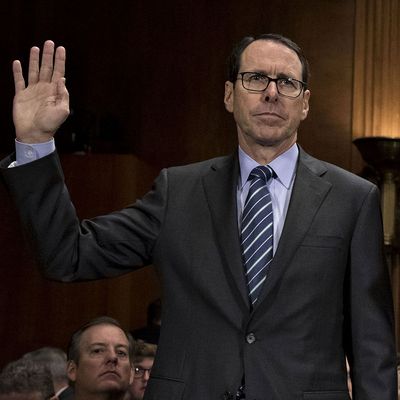
A federal judge has cleared the way for AT&T to merge with Time Warner, an $85 billion deal that will allow the mobile-phone giant to compete with Amazon and Netflix in the streaming-media market — and/or, enable AT&T to inhibit fair competition among cable providers, inflate the costs of visual entertainment for consumers, and spur a new wave of consolidation throughout America’s (already far-too-consolidated) corporate sector.
The Justice Department had sued to block the merger, in light of the latter potential consequences. AT&T asked the court to focus on the former. And Judge Richard J. Leon sided with the telecom.
In making that ruling, Leon reaffirmed the judiciary’s traditional tolerance for “vertical integration” — the technical term for mergers between companies that operate related, but distinct, businesses. The Justice Department had argued that letting AT&T (a content distributor) combine with Time Warner (a content creator) would reduce competition between the mobile-phone giant and its rivals, and thus, hurt consumers.
To see how this could happen, consider that, after the merger, AT&T would have the rights to all of HBO’s output, CNN, live NBA and NCAA broadcasts, and many more desirable Time Warner properties. The telecom would also have an interest in getting cable subscribers to switch from their providers to DirectTV (which AT&T already owns). Therefore, AT&T would likely increase the rates that other content distributors must pay to air Time Warner content — forcing its rivals to either raise prices on their subscribers (which would inspire some consumers to switch to DirectTV), or else accept lower profit margins (which would impair their ability to compete with AT&T in the long term).
For this reason, the government was hoping that Leon would at least put conditions on the merger, like requiring the telecom to sell off some of Time Warner’s most coveted properties. But Leon declined to put any conditions on the deal.
AT&T, for its part, insists that legacy media companies can’t compete with the rising titans of Amazon and Netflix unless they’re allowed to bring content creation and distribution under the same roof. After all, Netflix and Amazon are already vertically integrated. Before Leon’s verdict, AT&T’s stock price was down more than 10 percent on the year, as DirectTV was bleeding subscribers. To survive the great unbundling, AT&T needs a content package strong enough to gain it a share of the “over-the-top” media market.
The progressive, anti-monopolist might respond to this complaint by calling for the breakup of Netflix and Amazon, too. But for the moment, the progressive anti-monopolist has no power. And Leon’s decision is likely to trigger a wave of new mergers, as many executives were waiting to for the outcome of AT&T’s bid before pushing forward with their desired deals. For example, Comcast is reportedly eager to gobble up some of 21st Century Fox’s assets.
The Trump administration’s decision to challenge the AT&T–Time Warner merger was uncharacteristic. Trump’s appointees have not been known to buck regulatory tradition in ways that limit the power of big business. This fact — combined with the White House’s decision to repeatedly, publicly threaten to deny the merger in retaliation for CNN’s critical political coverage — led some to believe the lawsuit was politically motivated.
So, Leon’s ruling might have tempered our kleptocracy problem; but it definitely made our monopoly one a bit worse.






























